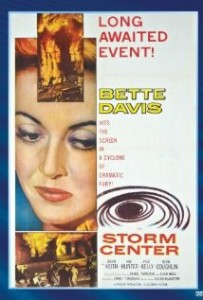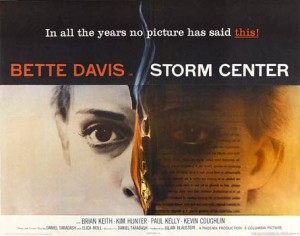Storm Center **** (1956, Bette Davis, Brian Keith, Kim Hunter, Kevin Coughlin, Paul Kelly) – Classic Movie Review 2745
Co-writer/director Daniel Taradash’s hesitant but important 1956 drama stars Bette Davis as widowed American small-town librarian Alicia Hull who is branded as a subversive and a Communist when she stands up to a campaign to make her remove a controversial book on communism from the library’s shelves.
This attack on book banning, censorship, gagging freedoms of belief and speech and small-town prejudice and by extension the appalling Communist witchhunt in America at the time is notable and hugely significant as the first movie to criticise the McCarthy trial era directly.
It was very brave at the time to tackle these two very controversial subjects of Communism and book banning, and the film’s main recommendation is that takes a powerful stance against censorship in an era when it was everywhere.
Alicia Hull is dedicated to introducing children to the joy of reading, but, in exchange for approving her request for a new children’s wing for the library, the city council asks her to withdraw the book The Communist Dream from the library’s collection. She refuses and is dismissed, greatly upsetting her young protégé Freddie Slater (Kevin Coughlin), but Judge Ellerbe (Paul Kelly) calls a town meeting to rally support for her.
Unfortunately Taradash’s and Elick Moll’s story and screenplay are melodramatic and sometimes implausible, but it says all the right things in a good-spirited, intelligent way, and Davis gives the movie a strong centre in a vital performance.
Co-stars Brian Keith as Paul Duncan and Kim Hunter as Martha Lockridge are also excellent, and there’s a long cast of welcome notable character actors in the support players.
However, the best of intentions aside, writer Taradash makes a slightly shaky first film as director. It proved to be the only film ever directed by Taradash, who decided to direct it himself when Stanley Kramer quit. The script was first offered to Kramer, who offered the star role to Mary Pickford, who was dissuaded from doing it by gossip columnist Hedda Hopper, who warned her the film was ‘pro-Communist’. She quit, citing that it was not a Technicolor movie.
The plot is largely fictional, but Alicia Hull is based on Ruth W Brown, a real-life librarian in Bartlesville, Oklahoma, and the film follows her struggle with the county commission over communist literature.
It was not well received by either critics or the public, which Davis believed to be the fault of the film, not the subject matter. She disapproved of the casting of little Kevin Coughlin as Freddie, resulted in what she considered a lack of emotional rapport between him and her, and making it hard to believe in the boy’s feelings of betrayal.
Davis said: ‘I was not overjoyed with the finished film. I had far higher hopes for it. The basic lack was the casting of the boy. He was not a warm, loving type of child. His relationship with the librarian was totally unemotional and therefore robbed the film of its most important factor.’ She was however appalled when Coughlin’s mother prepared the boy for his crying scenes by pinching him till it hurt.
The Legion of Decency did not like the movie because of what it considered the film’s ‘pro-Communist’ leanings. But, instead of condemning the film, it used a ‘separate classification’ for it.
After all those years of battling, work was running dry for Davis, and this is her last Hollywood film for five years until Pocketful of Miracles.
The film has an eye-catching poster and title sequence by Saul Bass, whose sequence features flames eating away at both the face of a boy and pages from a book.
Also in the cast are Joe Mantell, Sallie Brophie, Howard Wierum, Curtis Cooksey, Michael Raffetto, Kathryn Grant [Crosby], Howard Wendell, Burt Mustin, Edith Evanson, Malcolm Atterbury, Budd Buster, Alexander Campbell, Philip Crampton, Emlen Davies, Mildred Hays, Joseph Kearns, Ruby Lee, Ted Marc, Erwin Parker, Paul Ryan, Bucko Staford, Lora Lee Stansauk and Dora Dee Stansauk.
© Derek Winnert 2015 Classic Movie Review 2745
Check out more reviews on http://derekwinnert.com






